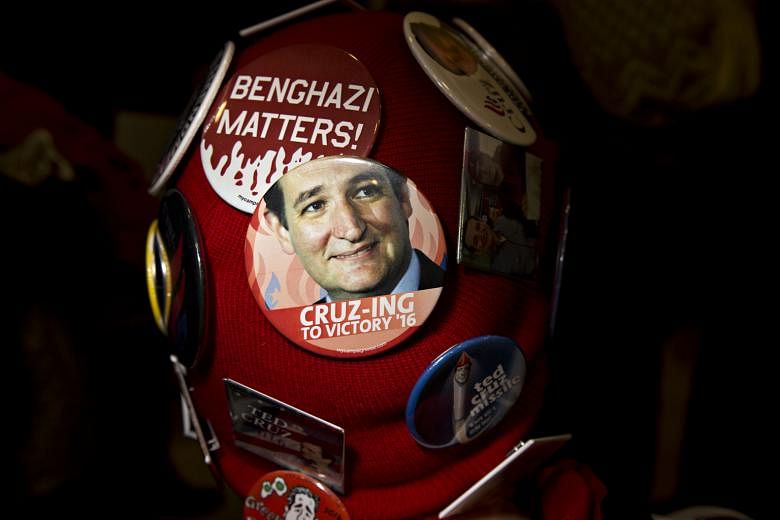Mr Ted Cruz, junior senator from Texas who upended expectations and cruised past poll-favourite Donald Trump in the first primary contest of this year's United States presidential campaign, is likely to encounter rougher sailing ahead in his bid to become the Republican candidate.
Senator Cruz won last week's caucuses in Iowa with 28 per cent of the votes, four points ahead of Mr Trump, the billionaire businessman that most polls put on top. But he is not expected to pull off a similar surprise tomorrow in New Hampshire.
His support in Iowa, in the conservative American heartland, reportedly came largely from fellow evangelical Christians and the far-right. In New Hampshire in the liberal north-east, voters on both sides of the political spectrum are more secular and left-leaning.
That would explain why an NBC News/Wall Street Journal/Marist Poll last Friday did not show Mr Cruz getting the kind of bump winners often get from a strong Iowa showing. In fact, it had him running third, behind both Mr Trump and another junior senator and fellow Hispanic-American, Florida's Marco Rubio.
Indeed, the biggest obstacle Mr Cruz may face on the long, winding road to the White House is his own political party. As the New Republic noted on its website last Thursday in a column called "Everybody hates Ted", Mr Cruz "has alienated just about everyone he has ever encountered in life: high school and college classmates, bosses, law professors, Supreme Court clerks and, especially, his Republican colleagues in the Senate".
And that was not just political spin from a liberal magazine. No less than the Republican Party's 2008 presidential nominee John McCain has called the Harvard-educated lawyer a "wacko bird" during his unsuccessful campaign against Democrat Barack Obama.
Certainly, Mr Cruz's impressive credentials belie his reputation.
He got his start as a clerk for US Supreme Court Chief Justice William Rehnquist in 1996, when he was barely 26. Soon after, he was serving in the US Justice Department and Federal Trade Commission.
In 2003, Mr Cruz returned to Texas as its Solicitor-General; no longer a mere clerk, he was arguing cases before the Supreme Court. By 2012, the anti-government, anti-tax Tea Party was rallying behind him, sending him back to Washington - and the prestigious Senate.
Now, Mr Cruz, whose father is a Cuban immigrant, is battling to become the first Hispanic-American president. Ordinarily, that would enable him to tap into the fast-growing Hispanic vote in the US, the way Mr Obama was able to win an overwhelming majority of African-American votes to win the presidency.
Yet, the day after the Iowa caucuses, La Opinion, the largest Spanish-language newspaper in the US, ran the headline: "Ted Cruz, first Latino to win the Iowa caucuses. Why aren't we celebrating?"
The story went on to answer the question by pointing out, in unflattering detail, that Mr Cruz has gone to great lengths to distance himself from his heritage. It noted that he even traded his Spanish nickname, Felito, for the unmistakeably Anglo-American Ted, short for Edward, his middle name.
The paper also slammed his tough positions on immigration, calling them an "insurmountable barrier" between Mr Cruz and the Hispanic electorate.
Beyond that voter segment, his anti-establishment rhetoric has turned off the Republican establishment. It fears that a candidate as controversial as Mr Cruz, like Mr Trump, would be hard-pressed to appeal to enough mainstream voters to win a presidential election, no matter who the Democrats choose.
Thus, it is no surprise that Republicans are already lining up behind the "other Hispanic-American", Mr Rubio, in New Hampshire, even though a GOP debate last Saturday saw seven Republican rivals tearing into one another and Mr Rubio floundering in deep embarrassment.
During the televised forum, Mr Rubio was relentlessly assailed by his contenders for being a political novice who lacked the chops.
The most blistering attack came from New Jersey governor Chris Christie, who derided the 44-year-old for his reliance on scripts prepared by his team.
Likening himself to Mr Barack Obama, who was a first-term senator before becoming the president in 2008, Mr Rubio said: "Let's dispel with this fiction that Barack Obama doesn't know what he's doing. He knows exactly what he's doing."
But seconds later, he proved Mr Christie right by delivering his lines almost word-for-word.
"There it is: The memorised 25- second speech," Mr Christie interrupted the visibly shaken Mr Rubio.
"I like Marco Rubio, and he's a smart person and a good guy," Mr Christie said. "But he simply does not have the experience to be President of the United States."
The final GOP debate came three days before the New Hampshire primary in the state-by-state battle to pick candidates in the presidential election, due on Nov 8.

